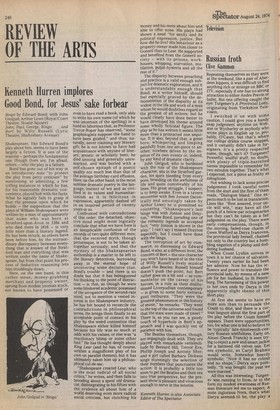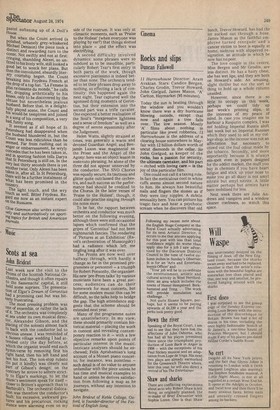Russian froth
Clive .Gammon Repeating themselves as they were at the weekend, like a pair of Aberdeen kippers, it was difficult to find anything rich or strange on BBC or ITV, especially if one has no strong attraction to either Andre Previn or ballet. But one offering caught the eye: Turgenev's A Provincial Lady,
from Yorkshire Tele
I switched it on with some caution. I could give you a handy snap judgement anytime on Webster or Wycherley or anybody who wrote plays in English up to, probably, O'Casey, but that's where our college drama course stopped, and it certainly didn't take in foreigners. It's a pretty respected name, though, isn't it? Turgenev? Powerful, soulful stuff, no doubt, with plenty of triple-barrelled names impossible to remember for two minutes together. That's what I expected, not a piece as frothy as zabaglione. Not wishing to lack some precise judgement I took careful notes from the start and the first of them reads, "Dialogue bland." One expects much to be lost in translation. tines like "Rest assured, your uncle will win," may have all the punch of a below-par octogenarian but they can't be taken as a fair judgement on the play. There were early compensations, though, in the moving, faded-rose charm of Gwen Watford as Darya Ivanovna, the provincial lady herself, chained not only to the country but a bumbling negation of a plump and doddering husband. When Count Lytibin arrives in town it is her chance of salvation. Twenty years earlier he had been her admirer. Now he has the influence and power to translate the provincial lady, by means of a new job for her husband, to St Petersburg. The harnessing of this power to her own ends by Darya is the apparently slight theme of this short play.
At first she seems to have no more aim than to persuade the Count to dine, and there is a curious languor about the first part of the play before the Count himself appears. There were opportunities, too, for what one is led to believe to be 'typically' late-nineteenth-century Russian wistfulness. Early on, Alexei (Derek Francis) is seen trying to reject a new and smart jacket for a battered old velvet one. Eet ees symbolic, as Caryl Brahrns would write. Somewhat heavilY symbolic: "Now it has no colour and no shape,"Darya says pointedly. "It was bought the year we were married."
All this was interesting: Turgenev was running to form, or to the form my modest awareness of Russian literature led me to expect. A mute inglorious Nora, that's what Darya seemed. to be, the play a pastel softening up of A Doll's House.
But when the Count arrived (a Polished, urbanely grey-whiskered Michael Denison) the piece took a distinct and rewarding turn to the comic. Not swiftly and not at first: cringing, shambling Alexei, so un fitted to his lively wife, still looked a good bet to wreck her plans. But then the convoluted, absurdly literary courtship began, the Count breaking into Feydeau French at the drop of a top hat. "La Femme la Plus ravissante du monde," he calls her, dropping arthritically to his knees, only to be discovered by the
Obtuse but nevertheless jealous husband. Before that, in a delight
fully scene, the Count and his would-be temptress and joined in a song of his composition, a very bad, funny song. It seemed as if all hope of St Petersburg had disappeared when the husband blundered in, but the
Count was less ridiculous than he seemed. Far from rushing out in anger or embarrassment, he wryly Concedes that he has been taken in, and in sporting fashion tells Darya that St Petersburg is still on. In the
very last thirty seconds there is yet another twist. Only Alexei has been taken in, after all. In St Petersburg, there will be a further instalment of What has been promised in the Country. The light touch, and the wry touch as well. Bitter Feydeau. Re gard me now as an instant expert on the Russians.
Clive Gammon also writes extensively and authoritatively on sport ing topics for British and American Journals.



































 Previous page
Previous page